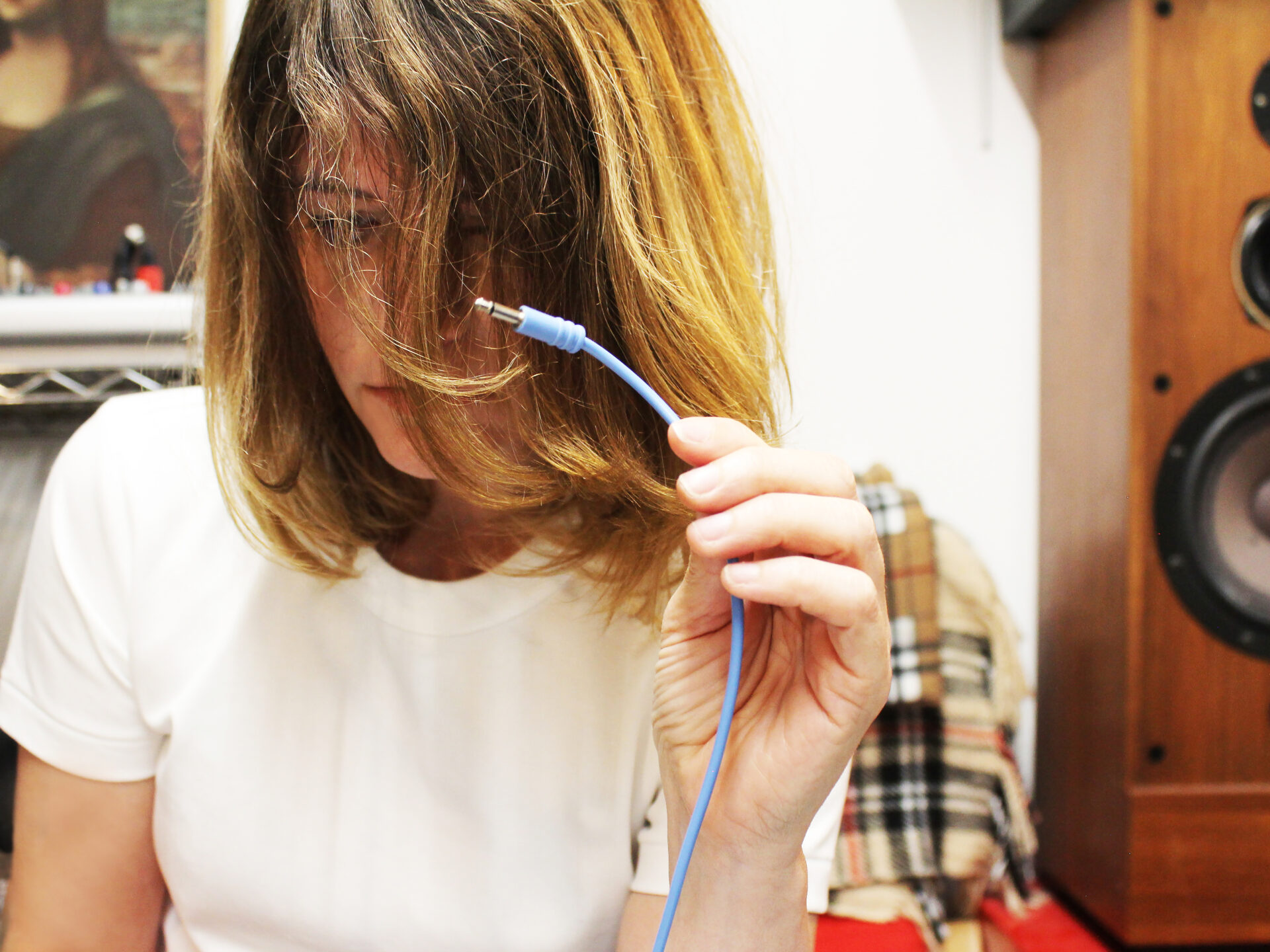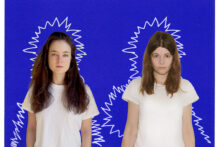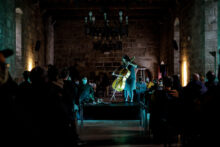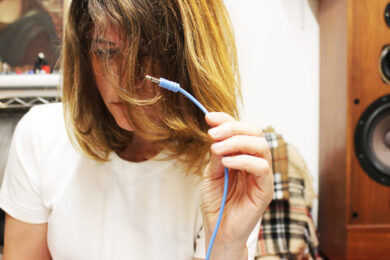When you think of the music of Factory Floor, it projects a certain environmental association to it. Perhaps one of crumbling walls in an industrial unit, as concrete cascades from the shuddering ceiling, or the smoke-filled throb of a club as their icy electronics stab and pulse through the air. It’s not necessarily music you would associate with a country manor surrounded by lush rolling green hills, a drunken gaggle of women on a hen party climbing onto a nearby tractor, or sheep dog trials taking place in a field. But here we are at Sutton Hall in Macclesfield, sat at a beer garden table surrounded by farmers, tractors and sheep dogs to discuss the return of the pulverising post-industrial-techno hypnotists, Factory Floor.
However, this is not to signify a new direction – a diversion into the bucolic or pastoral – but because Gabe Gurnsey lives here now, and the band have a rehearsal space in an old warehouse in town. But it’s also something of a symbolic full circle location for the band’s return; one which will see them play their first live show in five years at MUTEK Festival’s 25th anniversary this month in Montreal, after being asked by founder Alain Mongeau. “We first came to this place in about 2010,” recalls Nik Colk Void, of the manor-turned-pub that is nearly 500 years old. “As it was the result of us sending that letter.” The letter in question was written to New Order and Joy Division drummer Stephen Morris and was enclosed with a demo of the group. They marked the envelope simply “Stephen Morris: Macclesfield”. It got to him, he loved it, and soon enough they were in a studio together with Morris producing and remixing some of their work.
A killer run of 12”s, EPs and LPs followed – as well as live shows that contained teeth-shattering intensity and emphatic yet furious grooves that felt like they could instil levitating capabilities – but then the band went quiet. They released A Soundtrack For A Film in 2018, a recorded live score to Fritz Lang’s Metropolis, but then went their separate ways to focus on individual work. “I think we were both burnt out,” says Gurnsey. “The break was totally necessary. Although it wasn’t like we split up or anything but we were just going down different paths for a little bit.”
Both released excellent solo albums, with Gurnsey putting out Physical and Diablo on Erol Alkan’s Phantasy Sound label and with Void releasing Bucked Up Space on Editions Mego. Plus, they have both worked with a variety of other artists in between. Void has released collaborative records with Klara Lewis as well as the late Peter Rehberg, who sadly passed away in 2021, while Gurnsey has remained an in-demand remixer for everyone from Neu! to Working Men’s Club via Depeche Mode.
So what has brought them back together? “I really missed that energy of having more than one person on a stage,” says Void. “What I’ve done has mostly been tabletop work and I missed that physicality of Gabe on the drums and having this interaction of a real, physical liveness. I remember Factory Floor shows where the sound made your clothes flap. We had such an intense, insane sound.”
Gurnsey too craved that pummelling physicality. “I’ve missed playing drums live,” he says. “I played at home but it’s just not the same thing and I didn’t really want to get into another band playing a different style. I almost felt like Factory Floor is the only band I could be in playing drums. And since we got back together it’s been like, fucking hell, where’s that been? Why did that disappear?”
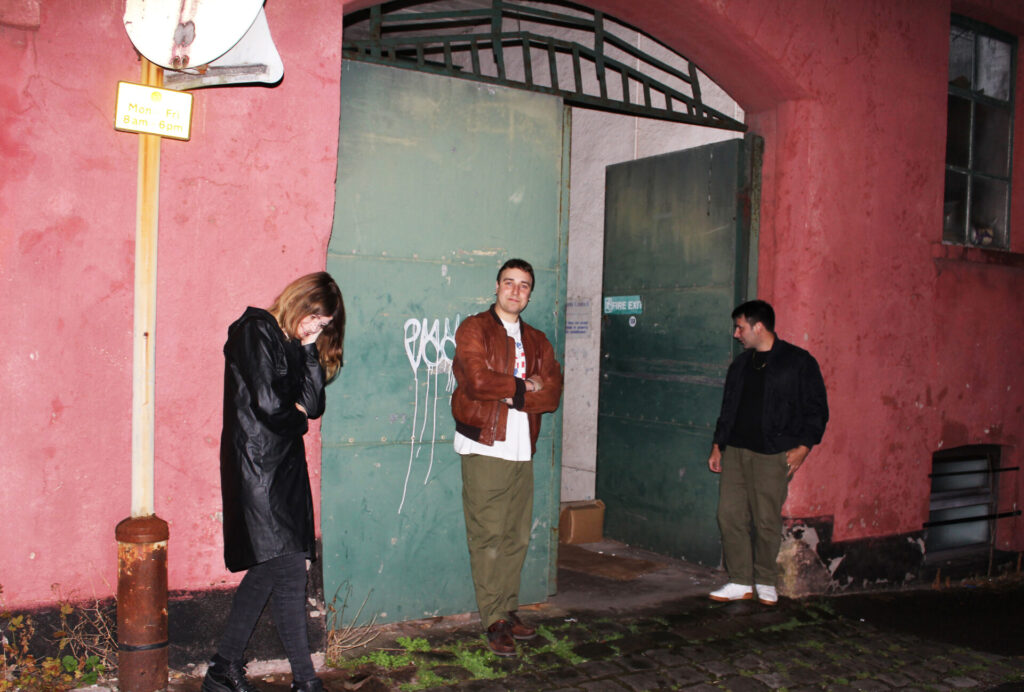
For Void in particular, it was imperative that she pursue her own solo endeavours. After working in Factory Floor and in Carter Tutti Void, a collaborative project with Chris Carter and Cosey Fanni Tutti, she needed something that was truly her own. “I had to go away and explore finding my own sound away from these really predominant players,” she says. “All these personalities were coming into play and so I had to find my own way. I feel like I have my own personality now.”
“You always did, though,” Gurnsey offers.
“Yeah, but you don’t recognise it,” says Void. “I think with any art, you have to really push yourself in a direction that’s uncomfortable in order to move forward.”
The pair have also both undergone changes and events in their personal lives that helped place Factory Floor into perspective. “Why stop a project that was really good?,” asks Void. “The absence of Peter [Rehberg] is making me realise that – that you shouldn’t throw things away too quickly. I think it’s also just understanding that the musical relationship we have isn’t finished. I feel like we’ve got to keep going. I really missed Gabe and Dom and I wanted to reach out to them. I really needed it back in my life.”
Dominic Butler originally left the band before the release of second album 25 25 (2016) but this fresh incarnation of Factory Floor, was initially conceived of as a trio again. The new iteration of the group did not have the most auspicious of starts however. The trio were in London to rehearse but things didn’t quite go to plan. “Gabe broke his foot because he ran out for a KFC,” laughs Void, before Gurnsey expands: “We were in a hotel on Old Street the night before and there was a KFC opposite and it was two in the morning and I was fucking starving. I walked out and fell flat on my face in the road and broke my fucking ankle. So I ended up not being able to play the drums. And I didn’t even get my burger, man.”
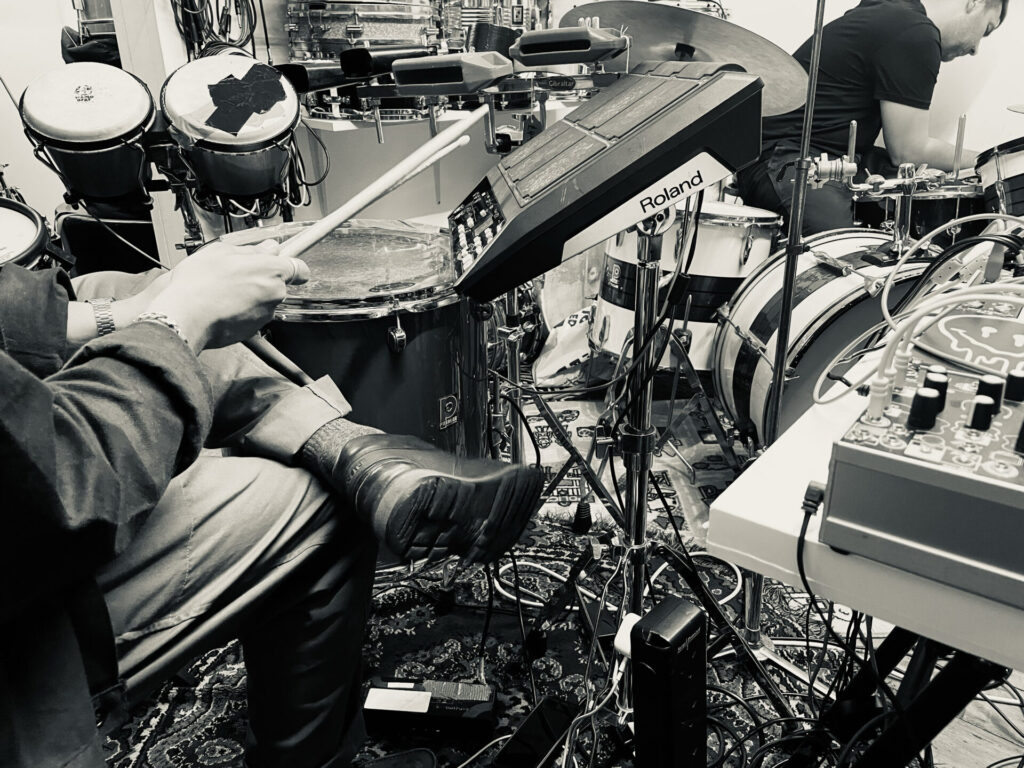
Things didn’t work out with the three of them so they pressed forward with just Void and Gurnsey, ditching all the material they had been putting together as a trio. However, they have now roped in Joe Ward as an additional live member from the band DEK. Gurnsey describes Ward’s role as “secondary percussion and electronic drums,” so are Factory Floor about to enter their double drummer period? “It’s close,” Gurnsey says. “I’m super excited about that.” And their expansion may not end there either; there’s talk of bringing in a potential fourth live member so that Void can explore the idea of bringing back in the sounds of her distorted and mangled guitar (as she’s currently immersed in a vast modular synth set up) into the sonic framework.
Once the KFC-induced ankle snap had healed, Gurnsey fell back into place pretty quickly behind the kit. “Gabe is actually like a human drum machine, you just press play,” says Void. “It felt really good. I didn’t have any expectations but after about ten minutes of playing it started to lock in straightaway. Which is kind of a sure sign that this is the right thing to do.”
The pair are currently putting together a set that is around half new material and half older stuff, with the aim of recording an EP in September for release later in the year. “It feels kind of spontaneous at the moment,” says Void. “But the MUTEK show is going to kick it off to get it all together. But the aim is to do it slowly. I think it’s really important that we do it for the right reasons. We’re not just coming back because it’s the easy option. It’s definitely not easy.”
With Void in Norfolk and Gurnsey in Macclesfield, it’s a nine hour round trip to get in the same room together to make music at the moment. However, the importance of a shared physical space is something that has always been paramount to the band, which is something they worked out even more conclusively with having more time for reflection. “When we did the second record Gabe was living in the US and I was in the middle of the countryside and that’s when the problems began,” says Void. “Because we weren’t in the same space. It ended up feeling really disjointed because we did it long distance.”
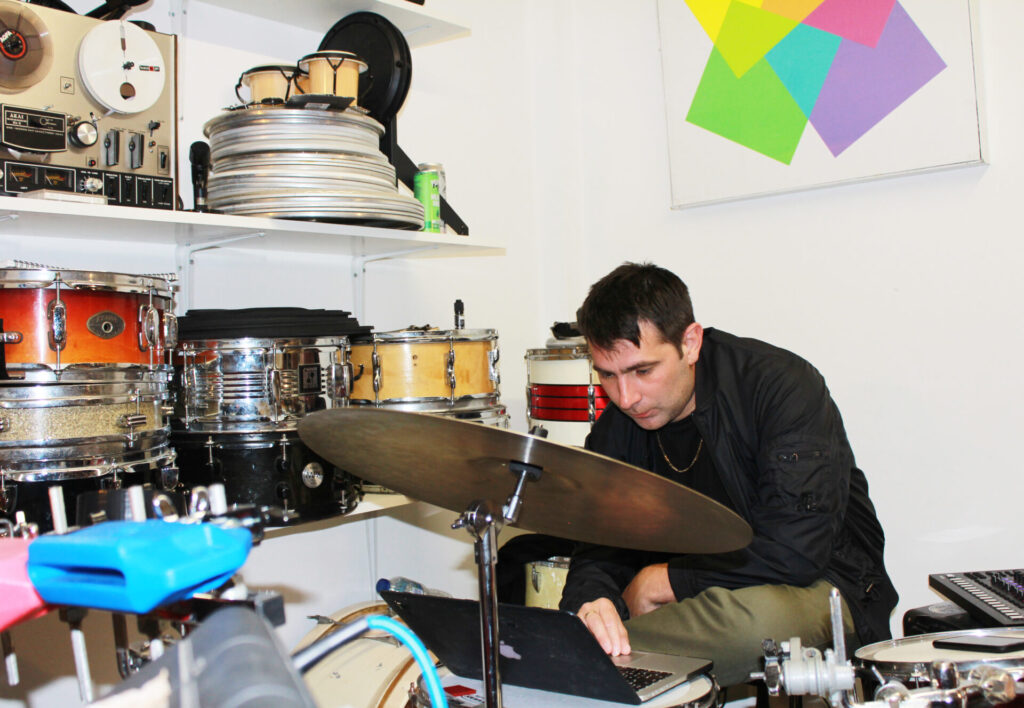
The story and trajectory of Factory Floor as a band is also one that runs parallel to a vastly changing and increasingly uninhabitable capital city for creatives to operate in. Factory Floor were able to live and experiment in London during a time when they were broke as hell but there was affordable space to access and rehearse, as well as foster relationships and communities. “We were really poor,” recalls Void. “So, so poor.” Gurnsey also remembers: “I was buying a synth one week and selling it two days later to pay the rent.”
But it was workable and it was vital. And it’s now become almost entirely impossible for new artists who were once in Factory Floor’s situation to even think about doing such a thing. “Having a place where you can live and breathe and have space to work is rare,” Void says. “But it was so important. We had to get out of the warehouse in the end because the area was getting gentrified and we tried to continue that same relationship we had while there but something was lacking. Moving away from London and that space was a massive factor in us not being able to write music in a similar vibe.”
Before they had a larger warehouse space to create in, Gurnsey recalls their first ever spot with great fondness. It was literally the size of a large cupboard, with all the band cramped up on top of one another as they rattled out music with throbbing intensity while locked, unavoidably, into one another’s eyes. “I remember we were playing ‘Wooden Box’ before we’d recorded it,” he recalls. “And Jas from Simian Mobile Disco opened the door and just went [thumbs up] and walked back out again. So I was like right we’ve got something now. That’s something that I totally miss; the traffic of things and people coming in and out of the warehouse. But it makes you realise that you shouldn’t take things for granted.”
The return of Factory Floor feels especially welcome in the current climate. Artists are being forced to strip back, cut down and make things more economic. All of which is completely understandable in a post-Brexit and cost of living landscape but in the world of electronic music this can often mean a surplus of sterile laptop shows. “It’s totally down to functionality,” says Void. “And I’m partly involved in that as well. I always take all my equipment as hand luggage on a flight. But I miss the shambolic nature of playing live and it feeling like it could all collapse. It’s really important that’s still there and I just feel like it needs to be back. And what we can offer is the chance to fall apart on stage.”
It’s clear the break and individual exploratory paths the pair have been on has served them both incredibly well. And rather than a band coming back from a prolonged absence and it feeling like it’s motivated by cash, lack of ideas, or nostalgia, it’s clear they are both bursting with supercharged enthusiasm for this next chapter. “It’s super nice to come back and it feel like, oh, this is the reason we were originally together as a band,” says Gurnsey. “I’ve really missed that. Right now it feels as exciting as it did back in the day playing ‘Wooden Box’ in that tiny room. It’s like being back in the cupboard.”

